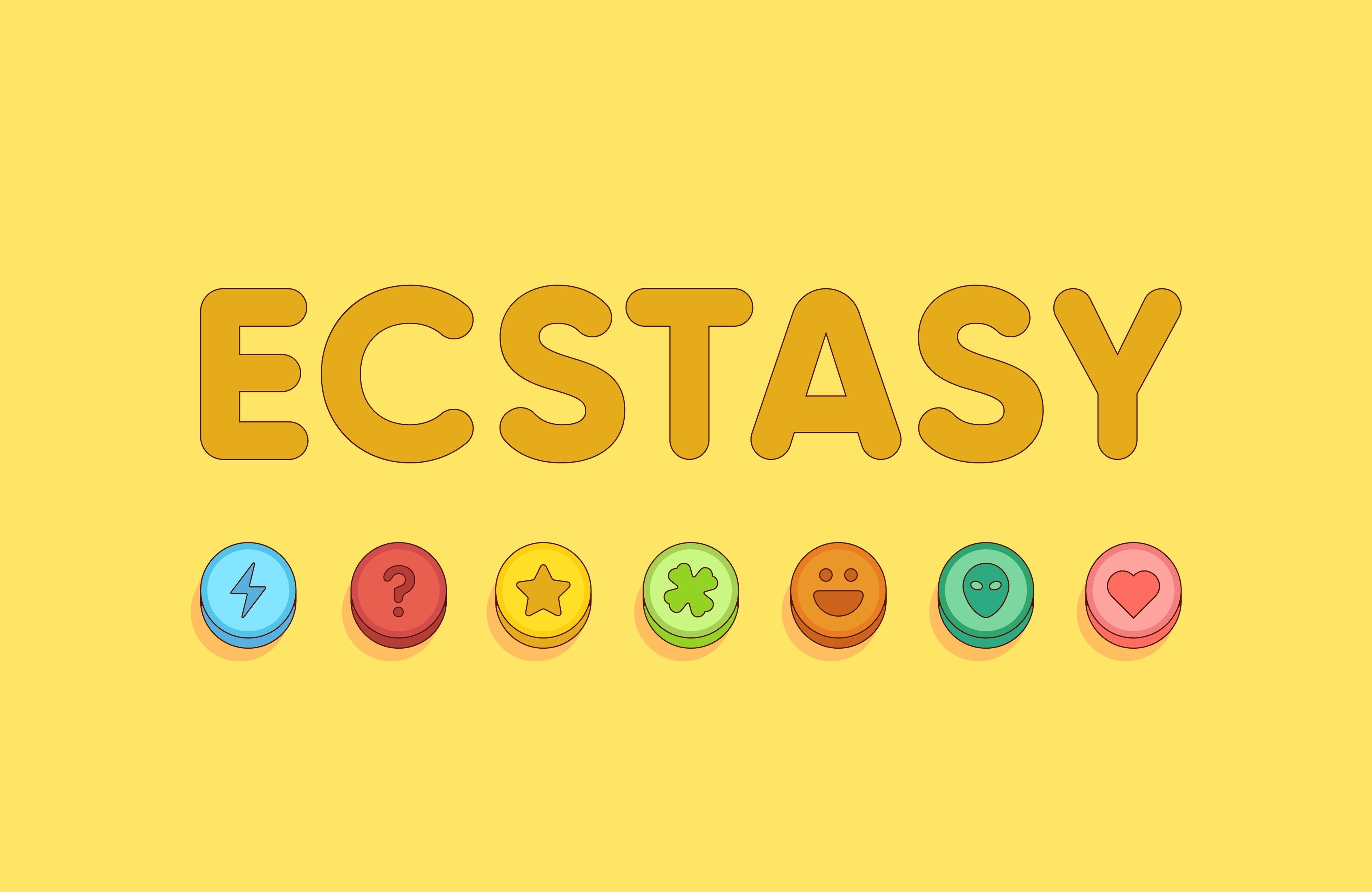Last Updated:
July 21st, 2025
Ecstasy (MDMA) Rehab Treatment | What to Expect
It can come as a huge shock when you realise what started as a bit of fun on the weekend has started to take over your life. Admitting that you are caught up in ecstasy addiction may be scary, but it is also a powerful first step towards change. Once you have admitted it to yourself, professional ecstasy addiction treatment can then help you break the cycle and recover your sense of self.

What is ecstasy rehab?
Ecstasy rehab, also known more generally as MDMA addiction treatment, is a specialised treatment programme for addiction recovery. Rehab’s primary goal is to help you quit taking ecstasy, but it does this by focusing on making lasting changes in your life.
Professional ecstasy rehab begins with a compassionate, thorough assessment to understand your personal needs, lifestyle and level of use. Central to the ecstasy rehab process is therapy designed to uncover why ecstasy became appealing to you in the first place. Rather than just focusing on withdrawal or abstinence, your therapists will help you confront emotional or social pressures, such as anxiety, stress, low self-esteem or peer influence, so they no longer affect your choices.
If ecstasy detox support is needed, this is carefully managed by medical professionals who help ease withdrawal symptoms and keep you comfortable throughout the process. Aftercare then continues your healing process long after the initial treatment ends, providing ongoing guidance, accountability and support through alumni groups and local support groups.
Why is ecstasy rehab important?
Ecstasy rehab is essential because MDMA significantly impacts your emotional and mental health, even if the harm isn’t immediately visible. Ecstasy changes the way your brain regulates, regulates, or fails to regulate, your emotions. This often leads to lasting mood issues like depression, anxiety and constant irritability.
Without professional support, these emotional shifts can make daily life very hard, isolate you socially and lead you back to ecstasy to cope. Treatment for ecstasy addiction helps you get better control over your emotions, react better to the challenges of life and give yourself the best chance of a happy future.
What does the ecstasy rehab process involve?
The ecstasy rehab process begins with your medical and therapy teams listening closely to your thoughts, experiences and struggles. This is very important because both addiction and treatment are very personal experiences, and no two people in recovery are the same. Your team will help to uncover your unique challenges and how ecstasy has become a way of dealing with them.
Ecstasy rehab programmes are then designed to work through these challenges in a systematic, holistic way. If stress is triggering ecstasy use, you will learn stress management techniques. If it comes from deep-seated trauma or a family history of substance abuse, you will work towards achieving closure. If you are part of a social scene where ecstasy use is prevalent, you will be guided in making crucial lifestyle changes.
All of this is achieved through a well-planned mixture of different approaches, some of which have been cornerstones of recovery treatment for years and others which may be newer, holistic solutions. By coming at the issue from multiple angles, ecstasy rehab ensures that no part of you goes unhealed.
What are the options for ecstasy addiction treatment?
In the UK, the range of ecstasy rehab programmes varies significantly, giving you the flexibility to choose based on your individual needs and lifestyle.
Outpatient ecstasy rehab programmes allow you to remain living at home while attending therapy sessions on a regular schedule. This format suits people who already have strong support networks and relatively moderate levels of dependency.
Alternatively, inpatient ecstasy rehab is often recommended for more severe cases or when your home environment isn’t supportive of recovery. Residential rehab provides a stable, immersive environment that removes daily distractions, stressors and temptations, allowing you to fully focus on getting better.
Some of the biggest differences between inpatient and outpatient ecstasy rehab include:
Setting
- Inpatient: Immersive, structured environment away from daily pressures.
- Outpatient: Home-based, integrating therapy into your existing routine.
Intensity and support
- Inpatient: Constant access to medical and emotional support.
- Outpatient: Intermittent support during therapy sessions.
Peer interaction
- Inpatient: Shared residential living with daily chances to socialise and connect with other people in recovery.
- Outpatient: The chance to meet recovery peers but only during sessions.
Flexibility and scheduling
- Inpatient: Predetermined daily schedules and activities.
- Outpatient: Designed around your personal schedule (availability allowing).
Cost and access
- Inpatient: Often available only at a fee-paying private ecstasy rehab centre.
- Outpatient: Usually more accessible, including NHS options, although waitlists may delay treatment.
What to expect in ecstasy rehab?
When considering different ecstasy rehab centres, the structure of the treatment programme, facilities, and amenities can also be important. Consider shared communal spaces, recreational activities on offer, accommodation and whether visits or phone calls from family and friends are permitted.
In terms of treatment, therapy sessions should form the core part of your day, ideally incorporating individual counselling and engaging group discussions. Additional activities include physical exercise, mindfulness practices and creative or expressive therapies, all carefully chosen to support your emotional recovery.
While it can be tempting to jump straight into treatment when you are eager to get started, it’s worth choosing. Selecting the right ecstasy rehab programme and centre is one of the most important decisions you will ever make, and it can set you up for the rest of your life.

Therapies involved in ecstasy addiction treatment
When evaluating an ecstasy rehab centre, you also need to pay careful attention to the therapies on offer. These may vary between different centres, but some of the most critical include:
How to find MDMA addiction treatment near me
If you have taken the brave step to seek treatment for ecstasy dependency, Addiction Helper is here for you. Our compassionate and experienced team will guide you through programmes so you can make an informed choice. Take the first empowering step today by contacting us; we will be by your side from here on out.
Our compassionate team are ready and available to take your call, and guide you towards lasting the lasting addiction recovery you deserve.
Frequently Asked Questions
(Click here to see works cited)
- NHS. “Drug addiction: getting help.” NHS, https://www.nhs.uk/live-well/addiction-support/drug-addiction-getting-help/. Accessed 23 March 2025.
- NIDA. “Treatment and Recovery.” National Institute on Drug Abuse, 25 Sep. 2023, https://nida.nih.gov/publications/drugs-brains-behavior-science-addiction/treatment-recovery. Accessed 23 March 2025.
- UK Addiction Treatment Centres. “Ecstasy addiction treatment | MDMA rehab | UKAT.” UK Addiction Treatment Centres, 10 October 2023, https://www.ukat.co.uk/rehab-treatment/drug/ecstasy/. Accessed 23 March 2025.
- National Institute on Drug Abuse. “How are MDMA use disorders treated?” National Institute on Drug Abuse, 26 September 2017, https://nida.nih.gov/publications/research-reports/mdma-ecstasy-abuse/how-are-mdma-use-disorders-treated. Accessed 23 March 2025.

